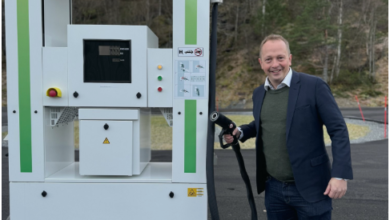UK’s leading hydrogen refuelling station provider set to triple testing growth by 2024

Haskel, the UK’s leading company for the manufacture of hydrogen refuelling stations, has reached a major milestone, shipping twelve systems in 2022, doubling the amount delivered in 2021.
The news comes in response to the fast growing demand for hydrogen refuelling stations globally.
The dozen new systems exported from Haskel’s Sunderland headquarters, made up a significant portion of the global growth in hydrogen refuelling stations last year. According to research by H2stations.org, a total of 130 stations entered operation in 2022. Haskel, an Ingersoll Rand company, will further scale production this year. Haskel and Ingersoll Rand are working hard to combine production at the Sunderland site with another major facility in Rouen, France, as it plans to double manufacturing capacity by 2024. This will increase output to more than 30 stations per year by 2024, an amount unrivalled in the UK hydrogen refuelling station market.
Haskel has taken significant steps recently to boost on site capabilities at the company’s Sunderland hub, doubling the number of stations being tested in 2022. This year they plan to rapidly scale operations, targeting an increase in capacity that will result in Haskel testing as many as 12 stations in 2024, an increase of 200% compared to 2022 levels.
Haskel has significantly scaled headcount to fulfil this strong pipeline of incoming projects. With 42 new hires over the last 12 months, the Haskel Hydrogen team has almost doubled its workforce in the past year. Growth has been driven by increased demand from numerous markets, notably continental Europe, New Zealand and Australia.
David Muckle, General Manager at Haskel Europe Ltd said: “The ability to quickly adapt to growing international demand follows substantial investment in Haskel’s test site in recent years. Since 2017 we have invested close to £2 million in both expanding operational capacity and upgrading equipment. Our 1500 square metre site, capable of testing four 40ft refuelling stations at a time, has been developed with a central purpose in mind, to help fuel the decarbonisation of global transport fleets, and put Sunderland on the map as a hub for hydrogen innovation.”
Market research commissioned by Haskel found that the Asia Pacific market size for hydrogen refuelling stations is set to more than triple in value between 2021 and 2029, forecast to reach USD 1,053.41 million by 2029.
Stewart Anderson, APAC Hydrogen Business Development Manager at Haskel, said: “Amid debate about how to grow the use of hydrogen in the UK to reach net zero, I’m mindful of how countries such as Australia and New Zealand are taking giant leaps in this arena. Driven by clear government strategy, which in turn has unlocked investment in infrastructure, there’s a roadmap to building a network of hydrogen refuelling stations capable of removing emissions from transport. I hope to see the UK adopt a similar approach, and unlock the expertise on its doorstep.”
Haskel has partnered with Hiringa Energy, the first company in New Zealand dedicated to the supply of green hydrogen. Together, they plan to rapidly scale the deployment of large-scale hydrogen refuelling stations for HGVs across New Zealand and Australia. Haskel’s hydrogen compressor systems can provide high capacity fuelling for buses and trucks up to 350 bar working pressure, with the potential to increase to 700 bar in the future. The first phase of the development includes four refuelling stations in the North Island, providing coverage for the major freight routes. This year will see the New Zealand routes expanded to include the South Island as well as progress on an east coast Australian network.
Andrew Clennett CEO Hiringa Energy “We forecast over 24 Hiringa high-capacity refuelling stations will come online across New Zealand in the next 4-5 years. This will provide unparalleled transport infrastructure and cement New Zealand as a centre for hydrogen innovation. A natural extension of our growth is into the Australian East Coast where we are advancing significant network plans. A key enabler for this expansion is our partnership with Haskel where their expertise and key equipment supply enables a commercially viable infrastructure model.”
